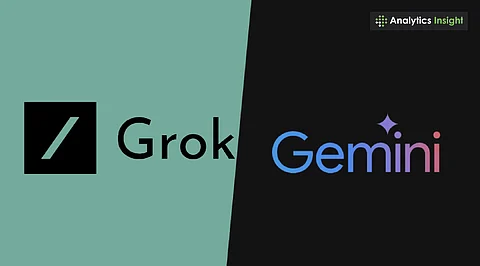

Grok excels in reasoning and innovation, with trend-aware coding and creative problem-solving, ideal for startups and research.
Gemini leads in enterprise workflows, offering 1 million-token context, fast speed, and seamless Google ecosystem integration.
Developers may benefit from hybrid use, combining Grok for ideation and Gemini for execution to maximize productivity.
AI coding assistants have revolutionized software development. Tools like xAI's Grok and Google's Gemini help developers code faster, debug smarter, and innovate boldly. Grok AI stands out with its sharp reasoning and real-time insights from X.
Gemini impresses with multimodal abilities and deep Google integrations. This article compares the features, performance, and usability of these two coding agents and helps decide which is the best AI for developers in 2025.
Grok 4 focuses on deep reasoning for STEM tasks. It outshines other agents in generating code from scratch across languages like Python and JavaScript. Its "Think" mode breaks down problems step by step. This is perfect for algorithmic challenges or edge-case handling.
Grok taps into X data for trend-aware coding. Developers can utilize it when building social APIs or exploring new frameworks. However, its 256k-token limit doesn’t support large projects. Additionally, the $3 per million tokens pricing makes it quite expensive for heavy users.
Gemini 2.5 Pro handles massive contexts with a 1 million-token window. It's ideal for enterprise codebases and legacy refactoring. Multimodal support processes images and videos. This aids visual debugging, like analyzing UI screenshots.
Seamless Google integrations boost collaboration. VS Code extensions and cloud tools make teamwork effortless. At $1.25 per million tokens and 150 tokens per second, Gemini offers great value. It shines in modifying existing code but may falter in pure innovation.
Also Read: Checkmate! Sam Altman’s ChatGPT Beats Elon Musk's Grok in AI Chess Final
Benchmarks show a close contest. Grok scores 86.5% on HumanEval, edging Gemini's 84% to 85%. In math-intensive tests like the American Invitational Mathematics Examination (AIME), Grok hits 94% accuracy. This highlights its algorithmic strength.
Gemini leads in Massive Multitask Language Understanding (MMLU) at 89.2% versus Grok's 86.6%. It tops Web Development Arena rankings for web tasks. Moving to speed, Gemini's low latency (3.62s) suits live coding, while Grok's 10.99s can frustrate developers.
Grok won 16 out of 18 complex tasks in user tests, like crafting a 3D black hole visualization. Users have appreciated Grok's accuracy and creativity and favor it for research and innovative projects.
Gemini excels in practical speed. It handles React or CSS projects with better constraint adherence. In PDF-based code reviews, Gemini finished in five minutes versus Grok's 6. Developers may prefer its efficiency for daily workflows.
The feedback from X communities shows mixed reactions. Some consider Grok "superior for deep thinking," while others prefer Gemini's "reliable integrations."
Grok AI integrates via xAI's API and apps. It's available on grok.com, X platforms, and mobile apps with voice mode. Additionally, subscriptions like SuperGrok offer higher quotas. This is best suited for power users but requires premium access.
Gemini is accessible through Google's ecosystem and offers free plans, with premium unlocking advanced features. Its VS Code plugin and cloud syncing enhance accessibility. Developers who use Google Workspace find it easy to use.
While both support multiple languages, Grok's X tie-in adds social context, and Gemini's multimodality provides a wider scope.
Also Read: Google AI Mode Gets Gemini 2.5 Pro for Smarter Search Results
Looking ahead, AI assistants like Grok 4.20 promise enhanced reasoning, and Gemini 3 boosts speed and accuracy. Hybrid use of Grok for ideation, Gemini for execution could become standard. However, there are major ethical considerations that need to be addressed. Both models also have biases in code generation and need monitoring.
Neither dominates fully in 2025. Grok is preferred for innovative, reasoning-heavy coding that is mostly required in startups or research. Gemini, on the other hand, is efficient and can handle scalable enterprise tasks with its speed and integrations. Depending on what the developers require, they can choose either or both to achieve better results.
1. Which is better for complex coding tasks, Grok or Gemini?
Grok performs better in deep reasoning and algorithmic challenges, making it ideal for complex coding tasks.
2. Is Gemini cheaper than Grok for developers?
Yes, Gemini costs $1.25 per million tokens, while Grok is priced at $3, making Gemini more cost-efficient.
3. Can Grok handle large enterprise projects?
Not as effectively, its 256k-token window is limiting compared to Gemini’s 1 million-token context for enterprise use.
4. Which AI coding tool is faster, Grok or Gemini?
Gemini is faster with lower latency (3.62s vs. Grok’s 10.99s), making it more suited for live coding and debugging.
5. Should beginners choose Grok or Gemini?
Beginners may enjoy Grok’s engaging, humorous tone, but Gemini is better for structured, collaborative learning in professional environments.
